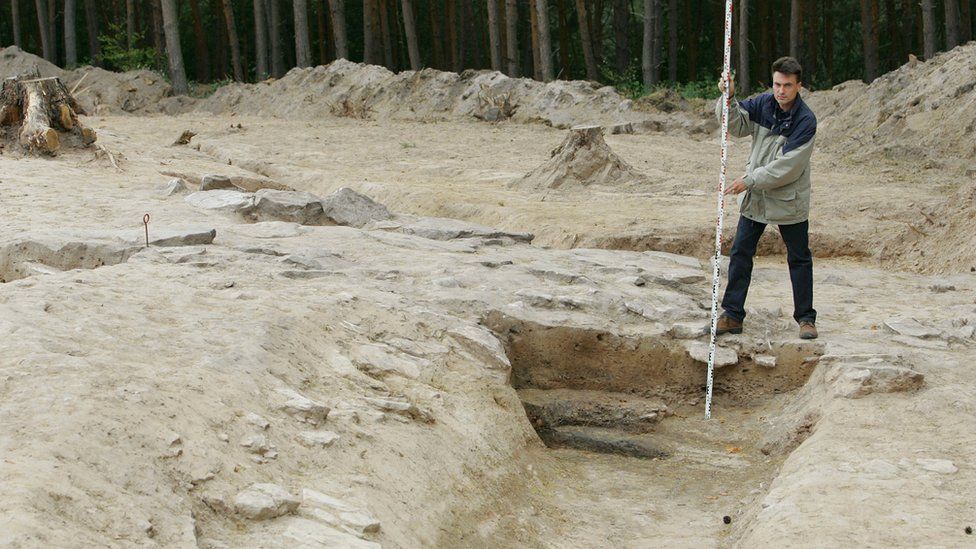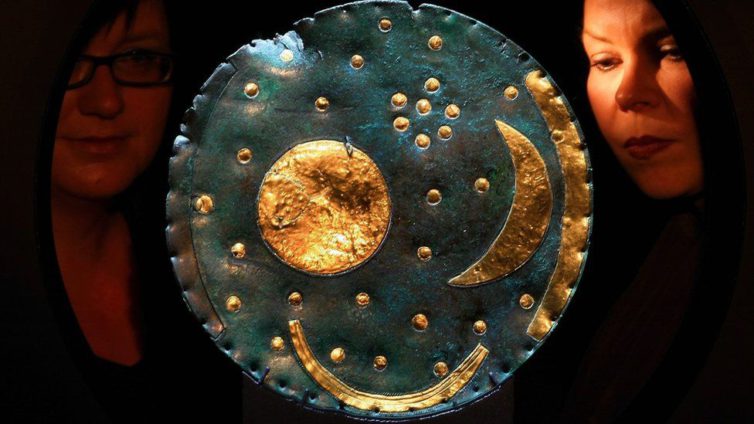An ancient object thought to be the world's oldest map of the stars is to go on display at the British Museum.
The Nebra Sky Disc is widely believed to be 3,600 years old, dating from the Bronze Age.
The bronze disc was unearthed in Germany in 1999 and is considered one of the most important archaeological finds of the 20th Century.
But its discovery has also been controversial, with a small number of scholars disputing its authenticity.
The Nebra disc measures about 30cm in diameter and has a blue-green patina emblazoned with gold symbols representing the Sun, Moon, stars, solstices and other cosmic phenomena.
According to Unesco, which includes the artefact on its global list of important historic documents, the disc gives a unique glimpse into humanity's early knowledge of the heavens.
It belongs to Germany's State Museum of Prehistory in Halle but is being loaned to the British Museum - the first time it has been loaned abroad in 15 years.
The British Museum said it would go on show as part of an exhibition on Stonehenge, opening in February.
"It's going to be eye-opening," said Neil Wilkin, curator of The World Of Stonehenge exhibition.

"The Nebra Sky Disc and the sun pendant are two of the most remarkable surviving objects from Bronze Age Europe," he said.
"Both have only recently been unearthed, literally, after remaining hidden in the ground for over three millennia.
"We're delighted that they will both be key pieces in our once-in-a-lifetime Stonehenge exhibition at the British Museum.
"While both were found hundreds of miles from Stonehenge, we'll be using them to shine a light on the vast interconnected world that existed around the ancient monument, spanning Britain, Ireland and mainland Europe."
The original purpose of Stonehenge remains a mystery, but the stone circle built in about 2,500 BC is aligned with the movements of the Sun.
The Sun and its solstices are also represented with markings on the Nebra disc - and experts believe the Sun was central to northern European Bronze Age religion.
Archaeologist and Bronze Age expert Prof Miranda Aldhouse-Green previously told the BBC that the symbols on the Nebra disc "are all part of a complex European-wide belief system whereby people looked at the heavens, worshipped them, worshipped the sun, worshipped the moon, aligned their monuments on the sunrise or the moonrise".
"And because Nebra has brought all these symbols together it tells us for the first time perhaps what people were really seeing, perceiving and believing."
She compared the Nebra disc to a visible version of a sacred text.
Colourful history
The disc was discovered near the town of Nebra in Germany along with swords, axes and other items dating from the Bronze Age.
It was found with a metal detector by two illegal treasure hunters, and later recovered by police in a sting.
While it is widely considered to date from the Bronze Age, in the past others have claimed it to be a fake.
And last September, the debate was reignited when two archaeologists published a new paper suggesting the object could be about 1,000 years younger and dating from the Iron Age.
The German museum has dismissed the claims, CNN reported, saying some claims were inconsistent, "not comprehensible" and that the researchers had ignored other published research.
The World Of Stonehenge will run from 17 February to 17 July next year.
Latest Stories
-
Stop funding foreign scholarships; Rechannel resources into local universities – Prof. Awandare to gov’t
2 minutes -
Afriy David drops new Afro-Gospel EP ‘God and Higher Life’
8 minutes -
Mid-year budget will rebuild domestic confidence- Prof Khalid
13 minutes -
Energy Ministry dismisses reports of aviation fuel shortage in Ghana
14 minutes -
Scandals and Reform in Ghana’s Security Sector: Opportunities arising from Revelations by Ministers for the Interior and Defence (PART I)
32 minutes -
Ghana to host Global Africa Diaspora Investment Summit in December
34 minutes -
Deputy Finance Minister rejects Minority’s claim of not spending
45 minutes -
UNICEF commends Ghana’s timely financing of immunisation program
54 minutes -
Fameye paid me GH¢5,000 to twerk to his song – Akuapem Poloo
1 hour -
Oppong Nkrumah demands budget clarity on flagship programmes
1 hour -
Camidoh explains why he ditched rapping to focus on singing
1 hour -
Father killed, son injured in armed robbery attack on Bole-Bamboi highway
2 hours -
Ghana Shippers Authority and Prof Ransford Edward Van Gyampo in focus
2 hours -
GH₵13bn for Big Push insufficient – Egyapa Mercer
2 hours -
I paid people to insult me so I would be popular – Akuapem Poloo
2 hours

